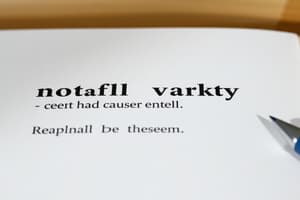Podcast
Questions and Answers
Which modal verb is the strongest and most serious?
Which modal verb is the strongest and most serious?
- Have got to
- Have to
- Must (correct)
- Should
Which of the following modals can express annoyance or frustration?
Which of the following modals can express annoyance or frustration?
- Must (correct)
- Ought to
- Should
- Could
Which modal verb is most commonly used in informal speech?
Which modal verb is most commonly used in informal speech?
- Have got to (correct)
- Must
- Should
- Have to
Which modal implies a stronger recommendation than "could"?
Which modal implies a stronger recommendation than "could"?
Which of the following is the correct way to express past time with these modals?
Which of the following is the correct way to express past time with these modals?
In what settings are modals used differently?
In what settings are modals used differently?
Flashcards are hidden until you start studying
Study Notes
- Modal verbs express ability, necessity, and prohibition.
- "Must," "have got to," and "have to" express necessity or obligation.
- "Must" is the strongest and most serious modal verb.
- "Have got to" is most common in informal speech.
- "Have to" is the most commonly used modal of obligation and is useful for forming questions and negatives.
- "Have got to" and "have to" require a simple verb to follow them.
- The only way to express past time with these modals is "had to."
- "Have got to" is often contracted as "I've gotta" in speech.
- "Have to" often sounds like "I hafta" or "She hasta" in speech.
- "Gotta," "hafta," and "hasta" cannot be used in written English.
Studying That Suits You
Use AI to generate personalized quizzes and flashcards to suit your learning preferences.




